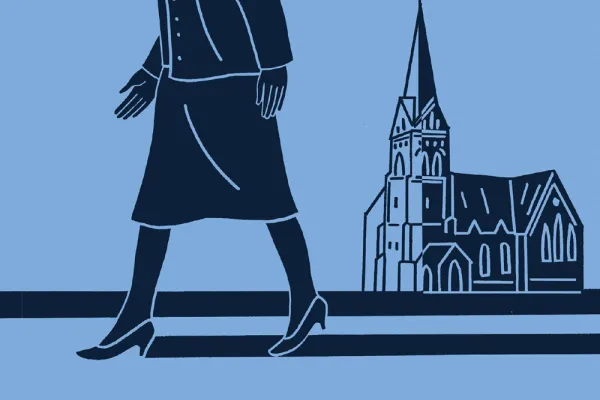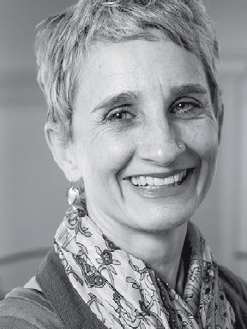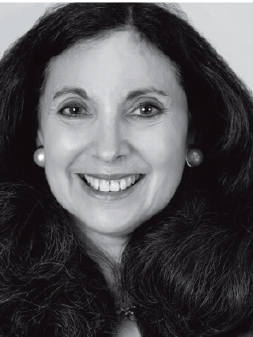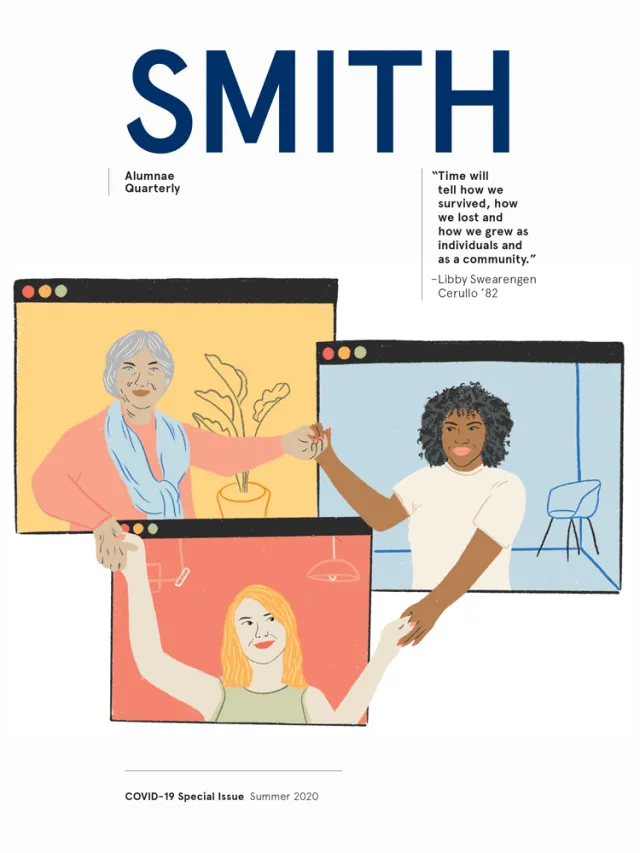Dawn of a New Day
Campus Life

Published June 18, 2020
Pandemic teaches an important lesson: We have the collective power to bring about a better way of living.
By the Rt. Rev. Jennifer Baskerville-Burrows ’88
 In these days of staying at home, I take a walk at 5 p.m. every day. Sometimes I walk with my 9-year-old son, sometimes I walk at an appropriate social distance with a colleague and sometimes I walk while listening to a podcast. This is a simple routine, but I’ve come to think of it as the foundation on which I will build my post-pandemic life.
In these days of staying at home, I take a walk at 5 p.m. every day. Sometimes I walk with my 9-year-old son, sometimes I walk at an appropriate social distance with a colleague and sometimes I walk while listening to a podcast. This is a simple routine, but I’ve come to think of it as the foundation on which I will build my post-pandemic life.
Before the COVID-19 pandemic, I was rarely able to take a walk at the end of the workday. As a bishop in the Episcopal Church, I care for 48 congregations in central and southern Indiana. My life was often a blur of evening meetings, command performances and airplanes taking off before dawn and landing after dusk. Ironically, I was expending much of my energy in creating communities where people nurture, care and advocate for one other. But here I was, moving so fast that I had a hard time connecting with family, friends and community myself.
During these days of self-isolation and quarantine, I’m not the only one learning a lot about who I want to be. Every day, as I Zoom with leaders in the congregations I serve and with colleagues across the Episcopal Church, I hear people express a desire for greater connection in their lives. People are gaining the courage to ask for what they need and to imagine communities that prize meaningful relationships over ceaseless striving to succeed in a manifestly unjust economy. We recognize that our ability to engage in self-discovery during the pandemic rests on the backs of a lot of black and brown people who have simultaneously been declared both essential and disposable, and we no longer want to be complicit in that system.
My job in these conversations is often simply to name and nurture the emerging hope that we can construct our lives in a different way. We have the wisdom to stay grounded locally while embracing the global community. We know how to support one another across lines of race and class, and we are persuaded that we must use our privilege to amplify the voices of those who go unheard and spend our money in ways that support an economy we can believe in. We know how to repair the breach in our lives and our communities. Yet we must continue to rely on our collective hope in withstanding the mounting pressure to revive an economy and a way of life that was killing us.
The kind of community we need is embodied in the church at its best. But I first experienced it at Smith, where I received the gift of belonging in ways that allowed me, a first-generation college student, to have confidence in my own hope that things could be different. Now, more than 30 years later, I am yearning to teach a new generation about the power of collective hope, especially in the face of profound grief over the death and injustice that surrounds us. But I will be doing it much more often from home, taking a break to walk at 5 p.m.
The Rt. Rev. Jennifer Baskerville-Burrows ’88 is a bishop in the Episcopal diocese of Indianapolis.
Leap of Faith in a Moment of Spiritual Need
By the Rev. Matilda Rose Cantwell
 Many of us consider ourselves “spiritual but not religious,” and not necessarily “people of faith.” Even those who follow a religious path don’t always think of themselves as faithful—that is, believing consistently in some greater power that guides our steps and shows the way.
Many of us consider ourselves “spiritual but not religious,” and not necessarily “people of faith.” Even those who follow a religious path don’t always think of themselves as faithful—that is, believing consistently in some greater power that guides our steps and shows the way.
No doubt many of us wish we had faith, or more faith, to help us deal with the uncertainty, the loss of control and, for some, the suffering and loss that the COVID-19 pandemic has wrought.
But the pandemic is rife with opportunities for strengthening our faith.
First, we can cultivate self-forgiveness. Though none of us is at fault, we may nevertheless blame ourselves, turning our disappointment inward because it gives us the illusion of control. But the more we let go of self-condemnation, the more curious, open, compassionate, and hence useful to the struggling world we are likely to be.
Second, it does no good to rate our suffering. Perhaps we are not struggling as much as others we know or see or read about or even love, but that does not mean our own experience is any less real. When we are awake to our own pain, our heart grows to make room for the pain of others.
Third, now is our opportunity to put faith into practice: being present with our experience; not judging others; practicing solitude; and, above all, accepting things as they are, even as we work to change them.
Finally, we all want things to return to “normal”—but “normal” was unsustainable. Each of us, in our own way, has the opportunity to help create a new world, one in which we slow down, recognize the social disparities that now more than ever have been laid bare, and decide that the moral and ethical price of injustice and inequity is simply too high.
Amid the uncertainty and turmoil of this time, we may come to know that we are all people of faith and be the better for it for the rest of our lives.
The Rev. Matilda Rose Cantwell, MSW ’96, is the director of religious and spiritual life and Smith College chaplain.
Have Hope in the Future
By Rabbi Jill Hausman ’74
 In times of great difficulty, when there is nowhere to turn for help, we humans spontaneously turn to prayer. We do this from a deep, inner knowing that our connection to the spiritual is real. If it weren’t, prayer would be our first resort, not our last. Faith traditions show us a pathway into ourselves, where we can connect with goodness, health, holiness, joy and the Divine.
In times of great difficulty, when there is nowhere to turn for help, we humans spontaneously turn to prayer. We do this from a deep, inner knowing that our connection to the spiritual is real. If it weren’t, prayer would be our first resort, not our last. Faith traditions show us a pathway into ourselves, where we can connect with goodness, health, holiness, joy and the Divine.
There is a goodness beyond the physical, which many call God, that is always with us, helping and healing us. The Talmud teaches that God’s presence dwells where there is joy; the Chassidic masters of the 18th–19th centuries in Eastern Europe taught that joy is the best medicine. Science is now proving this. Fear depresses the immune system, while joy promotes it (Psychosomatic Medicine, 2003; Brain, Behavior, Immunity, 2006).
Our task is to consciously choose joyous memories and happy thoughts and images of the future, keeping ourselves healthy by taking practical precautions and by insulating ourselves from all the negative messages the media sends to us. If we can manage our emotions, independent of the circumstances, choosing to be joyous, we connect to the Source of Life where there is abundant goodness and healing.
The story of Noah teaches us to have hope in the future and optimism that life will improve and the sun will shine again. Faith helps us to know that we are not alone, rather, that we are all connected as one soul, one life, held within the Divine.
Rabbi Jill Hausman ’74 serves at The Actors’ Temple, Congregation Ezrath Israel, in New York City.
This story appears in the Summer 2020 issue of the Smith Alumnae Quarterly.

A Semester Like No Other: How the class of 2020 left campus with a proper send-off.
Smith’s All-Hands Crisis Response: Entire campus community takes up an array of challenges presented by a dangerous pandemic.
Connection Out of Isolation: 12 voices collaborate on a poem for our time.
Mission to Make Masks: Students, staff rev up sewing machines to fill a community need.
One Student: Studio art major Sophie Willard Van Sistine ’22 finds her niche writing comics.
Race for a Vaccine: Dr. Annie De Groot ’78 and her biotech firm are on the front line to stop COVID-19 in its tracks.
Virtual Togetherness: Quarantines fall away as Smith friends Zoom into one another’s living rooms.
Echoes of a Pandemic: From canceled classes to campus quarantines, effects of the 1918 Spanish flu ring familiar.
Finding the Funny: An improv comedian’s tips for staying sane in the pandemic.
How Can I Help? From online classes to concerts and community fundraisers, alumnae find creative ways to ease the burden of those in need.
The Morning Call That Never Came: Death of a parent in the age of COVID-19 carries an extra layer of grief.
Racialization of Infectious Disease: As viruses spread, so does discrimination against marginalized groups.
Dawn of a New Day: Faith leaders impart messages of hope, acceptance and belief in our collective power to work for a better world.
Illustration by Anthony Russo